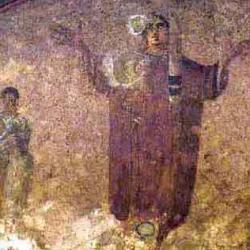In his commentary on Hebrews, William Lane disputes the common view that Hebrews 1:6 refers to the incarnation when it says that God brought the “firstborn into the world.” The Greek word behind “world” is oikoumene, which, Lane argues, typically refers to “habitable land, in contrast to the arid, uninhabitable desert” (27).
In Hebrews 1:6, though, the reference is to the exaltation of the Son, and thus oikoumene “concerns neither the incarnation nor the parousia but the entrance of Christ into the heavenly world following his sacrificial death. Christ’s entrance into the world . . . in his incarnation entailed the humiliation of being made ‘lower than the angels’ (2:7, 9), but his entrance into the oikoumene (v 6) signified his enthronement and exaltation about the angels” (27).
Lane finds support for this interpretation in Hebrews 2:5, which speaks of an “oikoumene to come,” and indicates that it is the same oikoumene “about which we have been speaking.” Hebrews 1:6 specifies the time when the angels “were commanded to render homage to the Son.” Unrecognized in HIs incarnation, He is recognized and praised at His ascension to a heavenly throne (27-28).
In many passages of the New Testament, oikoumene specifically refers to the Greco-Roman imperial world. More theologically, it refers to the arrangement of Israel-and-Gentiles that God formed during and following the exile. Could this be the referent for Hebrews 1:6? What might that mean?
Perhaps this: In His exaltation, Jesus ascends to be the ruler of the Greco-Roman world. He is the high king above Caesar, as the early Christians insisted. But there is another oikoumene to come, the new administration of the world that follows the destruction of Jerusalem. By entering heaven, Jesus becomes the world-ruler of that new world-system, which now encompasses not only the Greco-Roman world but the entire earth. He is the firstborn, the Davidic king and Last Adam, who rules all.















